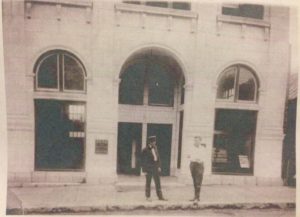Lafayette Flats’ official Historian, Carl McLaughlin, has been researching the history of our building and in this entry, he looks at the Bank of Fayette (for which our building was originally build to house) and one of its key employees.

President J.T. Grose and Cashier C.C. Huffman in front of the new bank
The Bank of Fayette moved into the Malcolm Building (today’s Lafayette Flats) in 1906. Joseph Tyler Grose had been the bank’s cashier since its organization in 1904 and worked from a
temporary location. Grose served as a cashier throughout the bank’s fifteen-year stay at this location. This was a landmark stone building at the corner of Court Street and Wiseman Avenue, directly across from the Court House.
In 1921 the bank moved to its newly built offices just down to the middle of the block, still across from the Court House. This building has a white-marble exterior facade with a stone
foundation. Today it serves as the home of the Town Hall for the city of Fayetteville. It was from this location that J. T. Grose had been elected president by the “close of business June 23, 1923.”
At the beginning of the Great Depression in1931, the bank suspended business and went into receivership. In 1932 the bank was officially dissolved in court.
J. T. Grose’s thirty-year banking career centered around the Bank of Fayette. However, this was not the first nor the last financial institution in which he played a key role.
In 1900 Grose held the position of vice-president in the Fayetteville National Bank.
Morris Harvey and his associates had organized this bank. Grose left this institution prior to 1904.
In 1910 Grose helped with the organization of the Fayetteville Building and Loan Association. He began as the Secretary-Treasurer, but by the “close of business on June 30, 1929,” Grose had been elected president.
In 1921 Grose became the president of the National Bank of Thurmond, a position he held while retaining his positions at the Bank of Fayette and the Building and Loan Association. Grose became president after he and his son-in-law, George C. Bullock, bought the majority of the bank stock.
In 1931 the bank at Thurmond closed, just as the Bank of Fayette, and in that year Grose was replaced as the president of the Building and Loan Association. Mr. Grose went into retirement in 1931 and passed away a few years later in 1934.
J.T. Grose had come to Fayette County as a young man to teach school. In 1887 Grose held the position of
Fayette County Superintendent of Schools. Grose’s family had many educators who all came from Nicholas County pioneer stock. The Panther Mountain area along the Gauley River, a rural farming area, was where Grose grew to manhood.
However, it was in Fayetteville, that Grose gained business experiences, held political office, and began making his associations with those who would become key people in his career advancement. Soon Grose was playing a key role in the city’s financial development. Grose had made a remarkable transition from a rural teacher to a businessman in the county seat of Fayette County at the beginning of a period of economic boom.